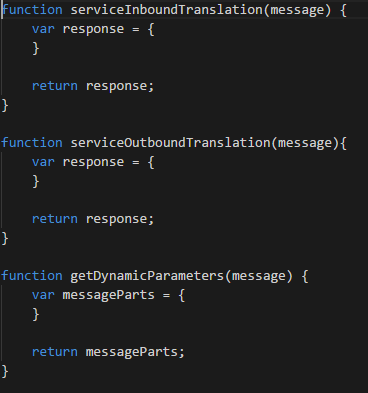Large enterprises usually have many programming languages across their departments. These departments, often located in different cities, will build teams out of what they see as the best-available local resources. It’s fairly common to find large-scale enterprise or government groups that have applications written in .NET and Java, never mind the plethora of other languages and flavours thereof. This technological mishmash is a major challenge to any sort of enterprise service bus; one that Orbital Bus is trying to overcome.
In creating Orbital Bus, we decided at the start that developers shouldn’t have to learn any new languages to implement our solution. The learning curve had to be minimal to ensure wide-spread adoption. We were able to deliver some of that goal by creating our Code Generation utility. This tool would allow us to take a single input and compile it to code usable by our ESB. However, this tool still needs input, so what were we to do?
Enter Javascript. We decided that by making the code generation input Javascript we would make it accessible to as many developers as possible with no extra work. No matter what language you develop in, you’ve probably had to work on some Javascript, whether to create visual effects or to load data with an Ajax call. We could implement Javascript with a high degree of confidence that users would be able to work with it without any sort of intimidating ramp. Javascript also provides a feature-rich environment that we don’t have to worry about maintaining. If developers want functionality that already exists in a library it’s minimal work for them to implement it. Along with Javascript, we were also able to rely on the JSON schema standard for modelling objects. We don’t have to worry about maintaining an API for describing models in our system. We simply have to point towards the standard we support and let the JSON schema community do the heavy lifting.
What exactly are we doing with all this Javascript? I mentioned the use of schemas to define models. We use models to define the types which are expected for the receiver. We take in standard JSON schemas to create C# classes which are then deployed as part of a contract library with the receiver. This library is used by receiver and the dispatcher. (Check out our article about using MEF with our contact libraries.) The models defined in this schema are also the ones expected by our translation engine. The receiver node of Orbital Bus takes Javascript translation files which it executes in both directions. With this feature developers can implement any translation they want as the information passes through the receiver node. These translations are simple .js files with method calls. We even support logging and business errors through integrated methods. Check out our documentation for more information on implementation. We even used JSON files for our configurations rather than XML to make sure that our points of contact with Orbital Bus are as unified as possible. As we grow Orbital Bus’ functionality we expect to grow its use of Javascript.

It was tough trying to think of the best way to support a polylinguistic development environment. Thankfully Javascript gave us a single point of entry we could use across many development environments. There’s still work we want to do with our Javascript implementation. We want to integrate libraries by default in our translations, allowing developers to use library calls without having to include them manually. We also want to add Javascript to our collection of connectors for the Orbital Bus. Thankfully, with a common input set out, Orbital Bus will be free to grow its implementations while continuing to support developers from a wide variety of backgrounds.